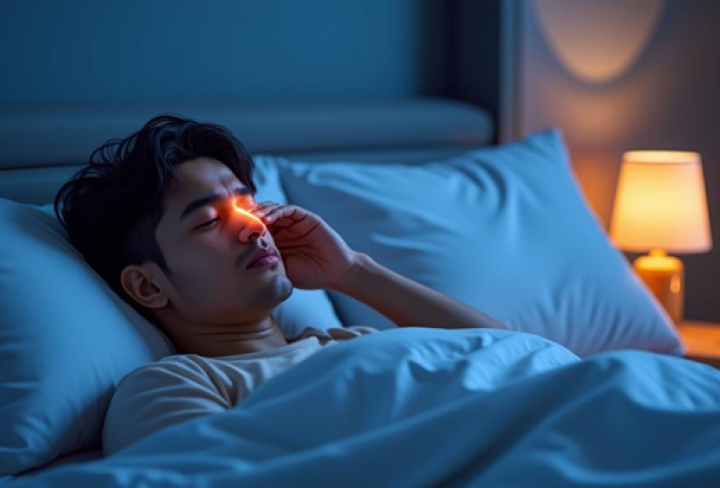Quality sleep is essential for our well-being. Without it, we feel groggy and unfocused throughout the day. However, a nasal issue could be the unseen thief of your restful nights. A deviated nasal septum is a condition where the thin wall inside your nose is off-center. It affects many people, making them suffer during sleep. By understanding this condition and exploring possible solutions, you can regain control over your sleep health.
The Basics: Understanding the Nasal Septum
The nasal septum is a thin wall inside your nose that separates your nostrils. It directs airflow efficiently through your nose. Sometimes, this wall isn’t perfectly straight, creating a deviated nasal septum. This might happen due to injuries, unusual growth patterns, or conditions present at birth.
Causes of a deviated nasal septum can vary: – Birth defect present from childhood. – Injury from sports or accidents. – Natural growth causing misalignment as the body changes.
Understanding these basics helps identify symptoms and seek possible care.
Sleep Woes: How a Deviated Septum Disrupts Your Night
When your nasal passage is blocked, it makes normal breathing hard. This blockage leads to sleeping problems. A deviated nasal septum often causes nasal obstruction. You might find yourself breathing more through your mouth.
Mouth breathing during sleep: – Dries your mouth and throat. – Makes you snore loudly. – Decreases sleep quality.
Snoring isn’t just noisy; it’s a sign of disrupted sleep. Over time, issues like these can contribute to sleep disorders, such as sleep apnea. This condition causes you to stop breathing during sleep and lowers your oxygen levels.
Without proper sleep, you might feel sleepy and unfocused every day. Addressing a deviated nasal septum is key to avoiding these challenges.
Spotting the Signs: Symptoms of a Sleep-Disrupting Deviated Septum
Recognizing symptoms early helps manage a deviated nasal septum effectively. Be aware of: – Trouble breathing through one or both nostrils. – Repeated sinus infections. – Frequent nosebleeds.
You may also experience headaches and facial pain. During sleep, keep an ear out for noisy breathing as this can be another telltale sign.
Getting Diagnosed: Your Path to Discovering a Deviated Septum
Diagnosis involves some straightforward procedures. A doctor will examine your nose and ask about your symptoms. They may use diagnostic tools like: – Nasal endoscopy to view inside your nose. – CT scans or MRIs for in-depth images.
These tools help create a clear map to plan deviated nasal septum treatments.
Exploring Non-Surgical Treatment Options
Not everyone needs surgery. Several non-invasive options can help: – Use nasal strips or nasal dilators to open passages. – Try saline rinses to clear blockages. – Consider nasal sprays, decongestants, or antihistamines for relief.
These options are great alternative treatment for deviated septum without surgery. They can enhance breathing and improve sleep initially.
Lifestyle Tweaks for Better Sleep Despite a Deviated Septum
A few simple lifestyle changes can boost better sleep with a deviated nasal septum: – Elevate your head with extra pillows during sleep. – Use a humidifier to moisten dry air. – Stay clear of allergens and maintain clean sleep surroundings.
These tips encourage better breathing and healthier sleep habits, even with a nasal septum issue.
When Surgery Becomes a Consideration: Understanding Septoplasty
Surgery, known as septoplasty, may be needed if symptoms are severe: – If breathing issues persist despite other treatments. – When persistent sinus infections occur.
During the procedure, the septum is straightened to allow better airflow. Recovery involves minor discomfort and a few days of rest. After recovery, most experience significant improvement in sleep quality and breathing.
Rounding Out Treatment: Considering Additional Health Factors
For complete treatment success, address other health concerns, such as allergies or sinus issues, that might worsen symptoms. Combining treatments ensures the best outcome for deviated nasal septum treatments.
Conclusion: Empowering Your Sleep Health Journey
A deviated nasal septum can disrupt sleep significantly. But you can explore solutions to reclaim restful nights. If these symptoms align with your experiences, seek advice from a professional.
Call to Action: Take Control of Your Sleep with Expert Guidance
If sleep troubles impact your life, reach out to an ENT specialist or sleep doctor. They provide tailored advice for your needs. Remember, quality sleep is crucial for good health and a vibrant life.

